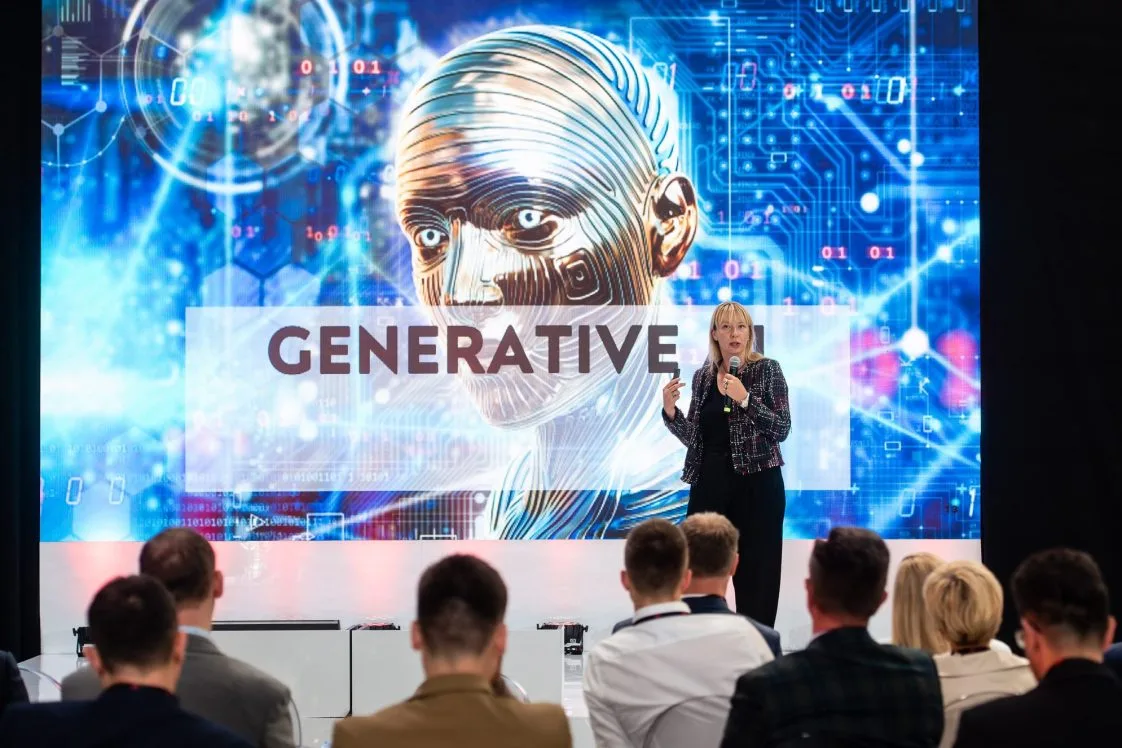Navigating the Future of Fulfilment with AI: Expert Perspective

In the ever-evolving landscape of technology, the journey of artificial intelligence (AI) is nothing short of fascinating. Its relentless progress has not only reshaped industries but has also ignited discussions about its future impact on businesses and society. To shed light on this intricate subject, we talked with Aleksandra Przegalińska, a distinguished expert in AI and a leading voice in the field.
Artificial intelligence is ushering in a new era where machines can now harness a surplus of capabilities that were traditionally believed to be the exclusive domain of humans. These include tasks such as processing natural language, interpreting visual information, recognizing intricate patterns, and even making complex decisions.
The emergence of generative intelligence in business
In a short interview, Aleksandra Przegalińska shares her perspective on what we can anticipate in the coming years regarding the evolution of artificial intelligence and its profound implications for businesses. Among other things, she says:
“What we can see is probably the refinement and rise of generative AI, and it’s possibly going to eat up other aspects of artificial intelligence; it becomes this prevalent mode in how we interact with AI. The main opportunity that we have at hand is this rise in productivity. It is very true that we can do things faster with generative AI and that, hopefully, we can also do it better. That’s at least what my research has been telling me. So, human + machine is better than a human, but it’s also better, much better than a machine”.
Harnessing AI for business operations
AI has the potential to make business operations more efficient, accurate, sustainable, and customer-centric. It’s not just a tool; it’s a strategic asset that empowers businesses to deliver the level of service that modern customers expect. How do companies do that?
- Radial uses it to predict and prevent problems in our core operations, which enables us to become more productive. AI optimizes our robot traffic and acts as a traffic control system for the robotic workforce. This helped us to streamline fulfilment processes. Our customers can expect faster order processing and shorter delivery times. Products can be picked, packed, and dispatched more swiftly, leading to a more efficient overall experience.
- Amazon uses AI to predict delivery times and to notify customers of any potential delays. This allows customers to plan ahead and to take steps in response to those delays, such as rescheduling deliveries or making alternative arrangements.
- Walmart optimizes its delivery routes with artificial intelligence. This has helped Walmart to reduce delivery times and to improve customer satisfaction.
- FedEx uses AI to resolve customer issues quickly and efficiently. Their AI-powered virtual assistant can answer customer questions, track shipments, and resolve issues in real-time.
- Maersk predicts delays and optimizes the loading and unloading of ships with the usage of AI.
Revolutionizing fulfilment: the diverse applications of AI in the business landscape
As the fulfilment industry embraces AI with open arms, we embark on a journey where every interaction, every order, and every customer query is an opportunity to shine. Artificial intelligence already supports and transforms our industry in a range of different fields.
Automation: AI-powered robotics and autonomous vehicles can handle tasks such as picking, packing, and moving goods within the warehouse. AI can also provide data and insights to help robots choose the most efficient path. These can improve accuracy and consequently increase through
Robot Maintenance: AI can monitor the condition of machinery and equipment in real time. Predictive maintenance algorithms can identify potential issues before they lead to breakdowns, reducing downtime and maintenance costs.
Warehouse management: AI can help to optimize warehouse layout, picking and packing operations, and connect different types of automation. This can help to optimize cost and productivity.
Quality control: AI can be used to inspect delivery details and to ensure that orders are shipped correctly. This can help to reduce the number of returns and improve customer satisfaction.
Customer support: AI can provide customers not only with real-time information on the whole supply chain but also predict future events and resolve these issues quickly and efficiently. AI-powered chatbots can streamline customers’ access to data and quickly handle customer inquiries.
Returns Management: AI can help streamline the returns process by automating return authorization, inspection, and restocking decisions. This reduces the cost and complexity of handling returns.
Sustainability: AI can optimize the use of lighting, heating, and cooling systems in the warehouse based on occupancy and external conditions, reducing energy consumption. We can use it to decrease the industry’s environmental impact on waste production and transportation emissions.
It’s evident that the integration of artificial intelligence in fulfilment operations is not just a trend. It’s a necessity for businesses aiming to thrive in the digital age. As this technology continues to develop, we can expect to see even more innovative and transformative applications in the near future. Artificial intelligence is not static; it’s dynamic, evolving, and adapting to meet the ever-changing demands of the industry. The future of fulfilment is intertwined with the future of AI, and together, they hold the promise of a more seamless, responsive, and customer-focused supply chain.
Considering streamlining your fulfilment operations in collaboration with an innovative partner? Click here to connect with Radial expert via our contact form.

Aleksandra Przegalińska is a leading expert on AI, AIER Visiting Research Fellow and a future Harvard Senior Research Fellow (US), and the Vice-Rector responsible for International Cooperation and ESR + Associate Professor at Kozminski University (Poland). Przegalińska has extensive experience in the field of AI, having worked as a researcher at MIT and Harvard. She is a frequent keynote speaker and has published numerous articles on the subject in leading academic journals. Przegalińska is passionate about using AI to make the world a better place. She is particularly interested in its ethical implications and how it can be used to promote social good. She is a strong advocate for responsible AI development and governance.
Follow Radial on LinkedIn.
